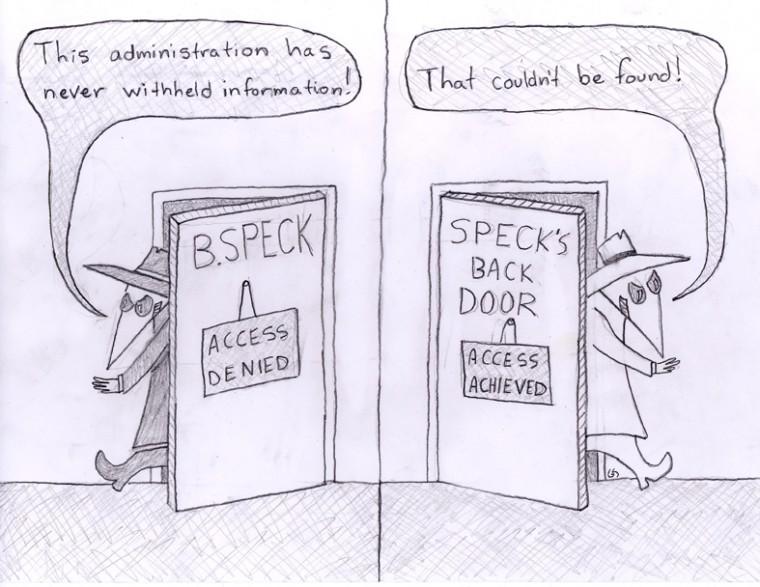Speck’s assertion simply doesn’t add up
It’s one thing to hear a fallacy and another to hear a bald-faced lie.
During the April 15 Board of Governors meeting I heard a bald-faced lie. And it came during University President Bruce Speck’s address.
Speck was speaking about the recent Higher Learning Commission focused visit during which a team of two investigated efforts made to improve strategic planning and shared governance at the University.
“When you look across the campus all the avenues that are open for communication, I think we can look at this as a milestone in the history of this institution,” Speck told the Board.
That statement was more of a fallacy.
It’s true there are numerous avenues for communication at this institution. The Faculty Senate, Staff Senate and Student Senate all serve a purpose and are forums for students and employees to voice displeasure and gratitude.
More often than not, however, it seems that whatever suggestions or criticisms are made are just ignored by the administration. Yes, there are several avenues for communication at Missouri Southern, but just because you own a baseball glove doesn’t mean you can call yourself a baseball player.
That wasn’t the statement that stuck out to me most, though.
“It is not appropriate to say the administration is held to a higher standard than anybody else on this campus,” Speck told the Board. “We have tried to be very transparent in our communication with the Board, with all of our constituencies. No one can make the accusation and back it up that we have held back information. That has not happened.”
That statement was a bold-faced lie.
It’s been exactly a year since the governing board for the Kansas City University of Medicine and Biosciences voted unanimously not to partner with Southern to bring a medical school branch to Joplin.
In a March 5, 2010 edition of The Chart, Speck is quoted in an article concerning the medical school project as saying “We’d like them to be clear and say, ‘Yes, we are planning on moving ahead, let’s do it,’ or, ‘No, we’re not, let’s don’t do it.’ I do not think it would be helpful for them to say, ‘Well, we’re not sure,’ because there are timing issues here. We’d like to get a very clear picture of what they’d like to do.”
Speck was referring to an upcoming April 2010 meeting of the KCUMB Board of Trustees during which discussion of the project was anticipated.
The Chart eventually requested email correspondence between Speck and the acting president of KCUMB, Danny Weaver, and the documents indicated sparse contact between the two. An anonymous source provided The Chart with another email that had been withheld from the request that was sent from Weaver to Speck on Feb. 25.
“Speaking candidly, if a vote were taken today, it would fail!!” Weaver wrote in the message, which he later confirmed to The Chart.
It seems like a double exclamation point after the world “fail” would give Speck enough of a “very clear picture” of how KCUMB was planning to vote, but despite receiving that message, Speck continued to tout the project and act like it was a done deal in public.
Isn’t that withholding information?
During our reporting on the medical school project, Speck abruptly began enforcing a media policy that limited access to himself and other top administrators. In fact, after spring break of 2010, Speck refused every single interview request made by The Chart for the rest of the semester.
Speck’s actions and his media policy led to a front-page editorial in The Chart’s April 2 edition, and the Student Press Law Center, a national organization advocating for the rights of student media, sent a letter of concern to Speck and the Board of Governors.
“To the extent that the policy instead functions as a selective screening device—and that its purpose and effect is to obstruct access by The Chart to faculty, staff and administrators—it is questionable both legally and as a matter of sound public policy,” SPLC Executive Director Frank LoMonte wrote in the letter.
“It likewise is not accepted protocol for a college president to refuse to talk to his own campus newspaper. That is the mark of an institution attempting to insulate instelf against scrutiny and to ‘spin’ the news. We might expect that behavior from a soft-drink company, but not from a public agency that is supposed to be transparent,” LoMonte wrote.
And finally,
“There undoubtedly will be times in the history of every institution when adverse publicity makes the school look bad. But a college that treats its employees and students with distrust, and elevates image control over transparency, does not merely ‘look bad.’ It is bad.”
It appears I’m not the only one who believes Speck has withheld information.
I contacted Speck’s office for a meeting last spring —not an interview—to discuss the media policy with the President and his refusal to accept interviews.
He granted my request, on the condition that I not take any notes, I not record any of the discussion and I never repeat anything that was said. I agreed, and while I can’t divulge what was said, I can say that the end result was Speck continuing to deny interview requests.
Isn’t that withholding information?
Speck’s statement about withholding information was just plain stupid. There was nothing beneficial in making the remarks. Don’t tell me it’s sunny outside while I’m getting rained on.
“No one can make the accusation and back it up that we have held back information. That has not happened,” Speck said.
Well I am making that accusation, and I am backing it up.
Your donation will support the student journalists of Missouri Southern State University. Your contribution will allow us to purchase equipment and cover our annual website hosting costs.




























